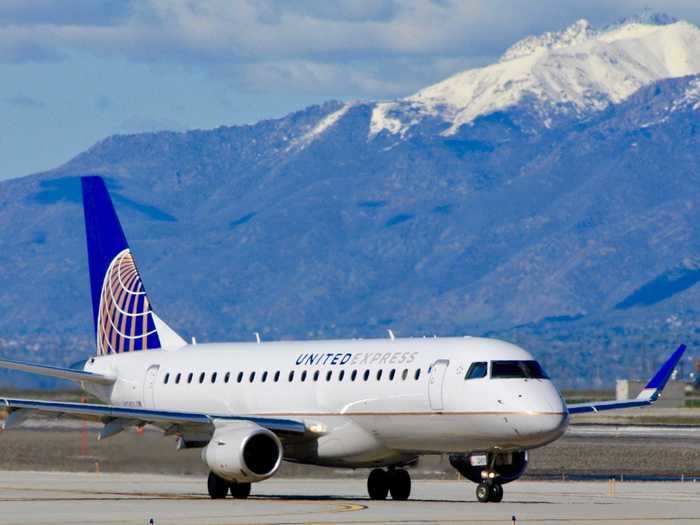
A United Express Embraer ERJ145 operated by ExpressJet Airlines.Austin Deppe/Shutterstock.com
Major US regional carrier ExpressJet Airlines ceased operations on September 30, the eve of aviation's day of reckoning as federal relief funding through the CARES Act unceremoniously expired.
Though its name isn't instantly recognizable to most, odds are that you've flown on one of its flights if you've taken a regional flight in the past decade. It's an airline that you can't buy a ticket to fly on, doesn't have any airport ticket counters, and doesn't advertise its own flights, but still flew thousands of passengers across the US and beyond until its untimely demise.
ExpressJet was once one of the country's largest and most prestigious regional airlines that performed flights for American Airlines, Delta Air Lines, and most recently, United Airlines. Its flights were operated by ExpressJet pilots and serviced by ExpressJet flight attendants but all passengers knew was that they were flying on an American, Delta, or United flight because that's what they're boarding passes said and their flight numbers indicated.
The secret was only revealed by a small decal on the side of its aircraft and possibly hidden deep in the safety briefing given by the flight attendant before each flight.
Thousands of employees working for the airline had been told of its collapse in July following an unsuccessful bid to continue flying regional flights for United. With no intervention or rescue plan, the Atlanta-based airline joined three other regional carriers that closed up shop this year.
Take a look at how one of the country's largest airlines vanished without a trace.

Source: ExpressJet Airlines


Source: ExpressJet Airlines


Source: ExpressJet Airlines

Source: Atlanta Journal-Constitution










Source: ABC News

Source: Santa Barbara Independent











 I spent $2,000 for 7 nights in a 179-square-foot room on one of the world's largest cruise ships. Take a look inside my cabin.
I spent $2,000 for 7 nights in a 179-square-foot room on one of the world's largest cruise ships. Take a look inside my cabin. Saudi Arabia wants China to help fund its struggling $500 billion Neom megaproject. Investors may not be too excited.
Saudi Arabia wants China to help fund its struggling $500 billion Neom megaproject. Investors may not be too excited. One of the world's only 5-star airlines seems to be considering asking business-class passengers to bring their own cutlery
One of the world's only 5-star airlines seems to be considering asking business-class passengers to bring their own cutlery From terrace to table: 8 Edible plants you can grow in your home
From terrace to table: 8 Edible plants you can grow in your home
 India fourth largest military spender globally in 2023: SIPRI report
India fourth largest military spender globally in 2023: SIPRI report
 New study forecasts high chance of record-breaking heat and humidity in India in the coming months
New study forecasts high chance of record-breaking heat and humidity in India in the coming months

Copyright © 2024. Times Internet Limited. All rights reserved.For reprint rights. Times Syndication Service.